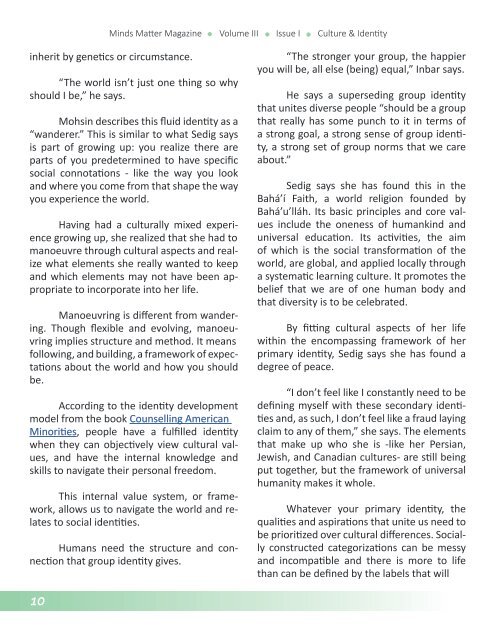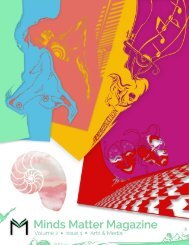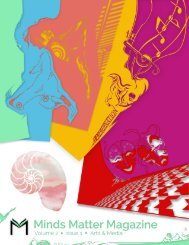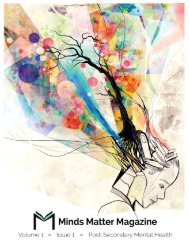Culture & Identity
You also want an ePaper? Increase the reach of your titles
YUMPU automatically turns print PDFs into web optimized ePapers that Google loves.
Minds Matter Magazine Volume III Issue I <strong>Culture</strong> & <strong>Identity</strong> Minds Matter Magazine Volume III Issue I <strong>Culture</strong> & <strong>Identity</strong><br />
inherit by genetics or circumstance.<br />
“The world isn’t just one thing so why<br />
should I be,” he says.<br />
Mohsin describes this fluid identity as a<br />
“wanderer.” This is similar to what Sedig says<br />
is part of growing up: you realize there are<br />
parts of you predetermined to have specific<br />
social connotations - like the way you look<br />
and where you come from that shape the way<br />
you experience the world.<br />
Having had a culturally mixed experience<br />
growing up, she realized that she had to<br />
manoeuvre through cultural aspects and realize<br />
what elements she really wanted to keep<br />
and which elements may not have been appropriate<br />
to incorporate into her life.<br />
Manoeuvring is different from wandering.<br />
Though flexible and evolving, manoeuvring<br />
implies structure and method. It means<br />
following, and building, a framework of expectations<br />
about the world and how you should<br />
be.<br />
According to the identity development<br />
model from the book Counselling American<br />
Minorities, people have a fulfilled identity<br />
when they can objectively view cultural values,<br />
and have the internal knowledge and<br />
skills to navigate their personal freedom.<br />
This internal value system, or framework,<br />
allows us to navigate the world and relates<br />
to social identities.<br />
Humans need the structure and connection<br />
that group identity gives.<br />
“The stronger your group, the happier<br />
you will be, all else (being) equal,” Inbar says.<br />
He says a superseding group identity<br />
that unites diverse people “should be a group<br />
that really has some punch to it in terms of<br />
a strong goal, a strong sense of group identity,<br />
a strong set of group norms that we care<br />
about.”<br />
Sedig says she has found this in the<br />
Bahá’í Faith, a world religion founded by<br />
Bahá’u’lláh. Its basic principles and core values<br />
include the oneness of humankind and<br />
universal education. Its activities, the aim<br />
of which is the social transformation of the<br />
world, are global, and applied locally through<br />
a systematic learning culture. It promotes the<br />
belief that we are of one human body and<br />
that diversity is to be celebrated.<br />
By fitting cultural aspects of her life<br />
within the encompassing framework of her<br />
primary identity, Sedig says she has found a<br />
degree of peace.<br />
“I don’t feel like I constantly need to be<br />
defining myself with these secondary identities<br />
and, as such, I don’t feel like a fraud laying<br />
claim to any of them,” she says. The elements<br />
that make up who she is -like her Persian,<br />
Jewish, and Canadian cultures- are still being<br />
put together, but the framework of universal<br />
humanity makes it whole.<br />
Whatever your primary identity, the<br />
qualities and aspirations that unite us need to<br />
be prioritized over cultural differences. Socially<br />
constructed categorizations can be messy<br />
and incompatible and there is more to life<br />
than can be defined by the labels that will<br />
always fall short of fully encompassing who<br />
we are.<br />
“We’re not titles, we’re not labels.<br />
We’re people. We’re human beings,” says<br />
Mohsin.<br />
That is the heart of the human framework,<br />
our primary identity.<br />
10<br />
11






